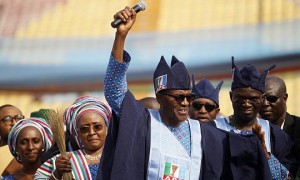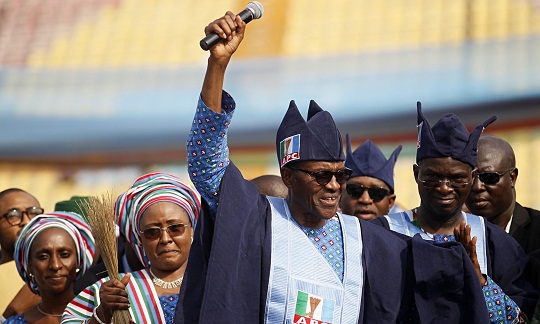BUT CAN APC’S VICTORY LEAD TO
THE CHANGE WE NEED?

The All Progressives Congress emerged from opposition as the “governing party” from the general elections of March and April, with a message of “Change!” Its flagbearer, General Muhammadu Buhari will be sworn in as President on May 29. It will also constitute the majority in both chambers of the National Assembly. It will now also form government in most states of the federation.
The presidential election was keenly contested, but the yearning for change was electrifying across the country. The immense majority of Nigerians had lost confidence in President Jonathan for several reasons: corruption; rising inequality; increasing insecurity; high unemployment rate, and; his “clueless” comportment. But, can General Buhari and the APC deliver on their promise of change? Is the APC’s wind of change a revolution? Indeed, what “change” do we as working people need?
APC defines itself as “a new party for a new Nigeria” in its manifesto: “Roadmap to a New Nigeria”. General Buhari equally commits himself to “Securing Nigeria’s Future” with his electoral platform. At the heart of the APC’s manifesto is the creation of jobs with “decent wages”. To do this, it intends to “create 20,000 jobs per state, immediately”. The party also claims it will show “zero tolerance for official and/or private sector corruption”. Free quality education is to be provided, including for tertiary institution students in education or science and technology disciplines. “One million low cost houses” are to be built “within four years for the poor”. “Free quality comprehensive health care” will be made available and “the number of practising physicians” doubled.
The near non-existent social security net of the state is to be strengthened, with “direct conditional monthly cash transfer of NGN5,000 to the 25 million poorest” citizens. Building of roads, power and infrastructure are not left out. Buhari’s manifesto (which basically complements that of his party), further buttresses this with the promise to “generate, transmit and distribute electricity on a 24/7 basis…by 2019”. He also promises to make sure that real GDP growth averages “at least 10-12% annually” for the benefit of the people.
All these are laudable goals. But first we ask ourselves, which of these items of the manifesto of the APC has its state governments implemented over the last two years? Their employment schemes have been on casual basis with abysmal wages, as low as N3,000 in some cases. Rather than make education qualitative and free, APC states have increased fees of their tertiary schools astronomically. They have introduced new user fees in their general hospitals and “low cost” houses they have built are totally unaffordable for the 99%. Concerning corruption, it is no secret that leading members of the APC are as corrupt as they come!
But maybe with the change movement that has now brought the party to national power, it has a renewed commitment to implementing its manifesto?
Indeed Buhari and the APC now face a dilemma. There is so much expectation. The teeming mass of Nigerians wants change. And change we have been promised by the APC. It is also instructive that General Buhari arguably has a track record of standing by the truth (Mai Gaskia). Thus, it could be expected that some efforts would be made to justify the confidence reposed in him with his victory this time.
But there will be pressures from other quarters. The sponsors of APC like the party leader, Bola Tinunbu; the former vice president Atiku Abubakar and a host of others are not likely to change their spots of self-aggrandisement overnight. The dynamics of long entrenched politics of patronage in the states is not likely to disappear, just like that. Conflicts and splits within the APC may not be ruled out over time, except the vestiges of those who see themselves as honest and true, sink into the APC flotsam.
The international dimension should also not be discountenanced. With dwindling oil resources, Buhari might find himself in the same quandary he was in 31 years ago, when forced to implement austerity measures after condemning these in the aftermath of his junta’s December 31, 1983 coup d’état. He most likely has also gotten “wiser” like Nelson Mandela did after his visit to Davos, that, to the ruling class globally, neoliberalism is the only game in town. His house has already turned into a Mecca of sorts with all sorts of diplomats, including from the United States, Britain, Israel and China paying visits.
Signs of reneging on campaign promises can also be seen already. Twice in a week in April, Buhari asked Nigerians not to expect miracles, with the excuse that so much damage was done to the system by PDP over the past 16 years and thus, APC would need time to set things right. Despite his strongman countenance and promise to defeat Boko Haram, he has also been honest enough to say the “Chibok girls” might never be found.
But, assuming APC fulfils its campaign promises (which would be very much welcomed, even if it seems unlikely at the moment), would this still represent the change we really need? The party’s programme is one of liberal reformism. Reforms help improve the quality of life of working people and could further the expansion of democratic rights. But they cannot lead to the birth of a new society based on equality and justice. Reformism only attempts to improveme the exploitative capitalist system which primarily benefits the bosses at the expense of the working masses.
The emancipation of the working class can be won only with workers’ power through revolution from below. Freedom is never given, it is won. To successfully wage political and ideological struggle for its self-emancipation, the working class must build its party, with a socialist programme. The failure of Dr. Jonathan was not just the failure of a government. It represented the failure that capitalism cannot but be, for the working masses. The upsurge of anger that swept his PDP out of power will most likely confront the APC sooner than later. Beyond the passing wind of change that “Buharism” might be, this is the time for activists and the leadership of the labour movement to build a mass-based labour party that can lead us forward towards social change.









